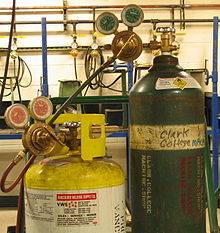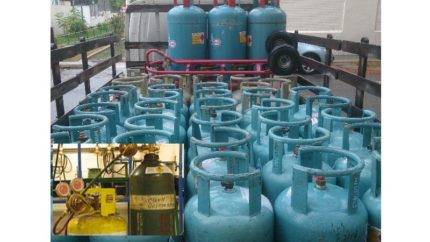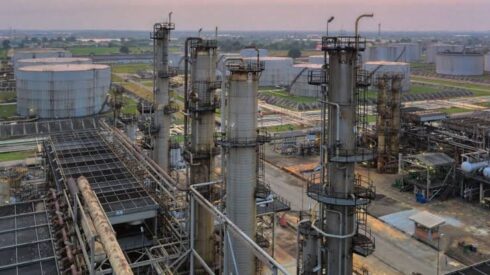Discover the latest breakthrough in national policy with the federal government’s pivotal decision on imported Liquefied Petroleum Gas (LPG) and its equipment. Unveiled through an official communication from the Ministry of Finance on November 28, 2023, this transformative policy marks a paradigm shift. The exemption of customs duty and value-added tax (VAT) on LPG imports positions Nigeria for a substantial drop in cooking gas prices nationwide, addressing a critical aspect of daily life. This strategic move underscores President Bola Tinubu’s commitment to enhancing the country’s investment climate and promoting environmentally conscious cooking practices.
As the government spearheads initiatives for affordable cooking gas, this bold policy echoes a broader vision of economic advancement and sustainable living. By eliminating financial barriers through the waiver of customs duty and VAT, the administration aims to not only alleviate the financial burden on households but also encourage the adoption of cleaner energy sources. This decisive step aligns with global sustainability goals while propelling Nigeria towards an energy-efficient and cost-effective future. Stay informed on the unfolding narrative of this policy as it reshapes the landscape of cooking gas accessibility, supporting both economic growth and environmental responsibility.

Presidential Commitment to Economic Enhancement
In a significant move for Nigeria’s economic growth, President Tinubu’s unwavering dedication to fostering a conducive investment environment takes center stage in the Ministry’s latest communication. This commitment, as detailed in a presidential directive dated July 29, 2022 (reference number PRES/88/MPR/99), underscores the paramount importance placed on reducing market prices and advancing clean cooking practices within the nation. The decisive action manifests in the form of a 0% duty rate and 0% VAT rate on LPG imports, facilitated through the application of specific HS Codes, signaling a proactive approach to address local demand and uplift the overall economic landscape.
President Tinubu’s strategic vision is unveiled in the ministry’s communication, as the directive not only responds to the pressing need for economic enhancement but also aligns with sustainable practices. By prioritizing the reduction of market prices and promoting clean cooking through targeted policy measures, the president aims to fortify Nigeria’s position in the global market while concurrently addressing local needs. This presidential commitment, as outlined in the directive, establishes a concrete framework for economic progress and resonates with the broader goal of fostering a resilient and environmentally conscious economy in Nigeria.
Swift Implementation and Compliance
In a decisive move towards efficient governance, the Ministry of Finance has mandated the Nigeria Customs Service (NCS) and the Federal Inland Revenue Service (FIRS) to swiftly implement a transformative decision. This strategic directive, pending official gazetting, emphasizes the government’s commitment to streamlining the LPG import process. The proactive measures ensure that both entities adhere promptly, showcasing the administration’s dedication to expeditious decision execution.
To reinforce this commitment, the NCS has been specifically instructed to rescind debit notes issued to petroleum marketers who imported LPG using designated codes from August 26, 2019, onwards. This targeted approach demonstrates the government’s resolve to rectify any potential discrepancies in the importation process. The synchronized efforts of the Ministry of Finance, NCS, and FIRS underscore a cohesive strategy aimed at fostering compliance and efficiency within the regulatory framework, elevating the overall effectiveness of the LPG importation system.
Unlocking Growth: Ministry’s Directive Sparks Industry Boom
In a strategic move, the Ministry has widened the scope of exemptions beyond LPG, encompassing pivotal components within the LPG sector. This bold directive spans across various essentials, such as LPG cylinders, cascades, gas leak detectors, steel pipes, valves, fittings, dispensers, generators, and trucks. By exempting these items from both VAT and duty payments, the Ministry aims to ignite a wave of encouragement throughout the LPG supply chain. This comprehensive approach stands as a beacon, fostering an environment conducive to growth and long-term sustainability. Industry stakeholders are set to benefit significantly, propelling the sector into a new era of prosperity.
Empowering Stakeholders: A Holistic Boost for the LPG Supply Chain
The Ministry’s progressive stance extends far beyond a singular focus on LPG, as evidenced by the extensive list of exemptions. By including a diverse range of crucial components, from cylinders to dispensers and steel pipes, the directive showcases a commitment to bolstering the entire LPG supply chain. This inclusive approach is poised to stimulate investments, innovation, and operational efficiency, creating a favorable landscape for industry participants. With VAT and duty relief strategically applied, the Ministry’s initiative not only fuels immediate economic advantages but also sets the stage for sustained growth and resilience within the dynamic LPG sector.
Gazetting and Legal Formalities
In an imperative move, the directive takes immediate effect; however, the Ministry of Finance underscores the significance of official gazetting for establishing enduring legal validity. This meticulous formal process guarantees the recognition and consistent enforcement of exemptions. The impending gazetting is poised to delineate a robust legal framework for stakeholders within the LPG industry, underscoring the government’s unwavering commitment to these pivotal policy adjustments. This foresighted approach not only bolsters the immediate implementation but also fortifies the foundation for long-term adherence and coherence in the evolving landscape of LPG regulations.
For stakeholders navigating the intricacies of the LPG industry, the gazetting process emerges as a linchpin for clarity and reliability. The Ministry of Finance’s emphasis on this formal step is pivotal, as it ensures not only immediate compliance but also acts as a lodestar for sustained legal standing. As the government positions itself at the forefront of these policy changes, the forthcoming gazette is anticipated to serve as a beacon, guiding industry players through a structured legal terrain. In essence, this dual-layered approach of immediate enforcement and impending gazetting not only signifies regulatory agility but also lays the groundwork for a stable and predictable regulatory environment, vital for stakeholders and the overall health of the LPG sector.
Anticipated Impact on Consumers and Industry: Unlocking Affordability and Sustainability
As the anticipation builds among consumers, the imminent policy shift is poised to bring about a significant positive impact on both households and businesses. Foremost among the expected changes is a substantial reduction in the cost of cooking gas, a welcome development that holds the promise of making LPG more accessible across various segments. This strategic move aligns seamlessly with broader sustainability goals, as affordability becomes a key driver for increased adoption of cleaner energy sources. The government’s proactive approach towards fostering clean energy solutions, coupled with efforts to enhance the investment climate, positions this policy initiative as a crucial step towards a more resilient and environmentally conscious future.
Government Leadership: Nurturing Clean Energy and Economic Growth
The government’s forward-thinking stance is evident in its commitment to clean energy solutions and the creation of an enhanced investment climate. By spearheading this policy shift, authorities are not only driving affordability but also fostering an environment conducive to economic growth. This proactive approach positions the initiative as a pivotal step, reflecting the administration’s dedication to shaping a more robust and environmentally conscious future. As consumers eagerly await the tangible effects, the government’s strategic move unfolds as a comprehensive strategy, intertwining economic considerations with a commitment to sustainability.
Table of Contents
Discover more from OGM News NG
Subscribe to get the latest posts sent to your email.













